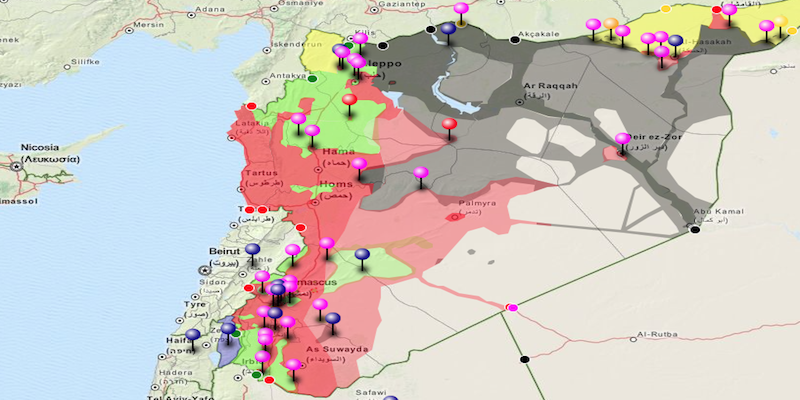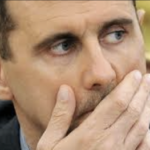Das gegenwärtige Machtspiel in Syrien
Syria will become increasingly fragmented in 2015. The Somaliaizaton or Balkanization of the country is inevitable so long as the international community degrades all centers of power in Syria and the opposition fails to unite.
Who owns what?
The four strongest authorities in Syria are the
- Assad government (45% of the land/65% of the population),
- ISIS (35% of the land/13% of the population),
- the Kurds (9% of the land),
- Nusra (5% of the land).
These four authorities together rule close to 95% of Syrian territory. This leaves the hundreds of additional militias controlling the remaining 5%, but in some areas no F.S.A. faction can operate without Nusra’s approval. Jihadis prevailed in 2014.
No one can win
All authorities will become weaker, with the possible exception of the Kurds. The United States is at war with all important Arab factions. It is actively bombing ISIS and Nusra, while sanctioning Assad. Although, Washington has funding a «train and equip» project to the tune of half a billion dollars, it appears to have neither urgency nor teeth.
Coalition forces are divided on objectives. This means that all centers of authority in Syria are being degraded, while none are being built up. It means no one can win. The Assad regime, ISIS, and Nusra are all likely to see their power diminish over the coming year. The FSA militias have become practically irrelevant and must take orders from the radicals. The educated and worldly activists who played such a vital role in launching the revolution have been pushed aside are today without influence. One can interpret this either as: a) Liberals and democrats in Syria were such a small elite that they were quickly swept aside by a the forces of tide of sectarians, fascists, and Islamists; or B) Assad intentionally destroyed the liberals and moderates so that he would face only extremists, leaving the world to face an either-or choice: Assad or al-Qaida.
The regime is trying to turn the rich against the poor
The Assad government strengthened its control over major cities, while losing control over rural areas. It gained ground in the Damascus suburbs, Kalamoun, Homs and Aleppo, but it lost territory in others, such as Idlib, the Golan, Deraa and the Jazira. This strategy reveals Assad’s urban bias. He believes he can regain the support of the urban middle classes who fear the radicalized and poorer country-folk.
The Baath originally relied on rural support against the cities. But as it went bankrupt and turned away from subsidies and socialism toward neo-liberal policies mixed with a heavy dose of corruption, it turned its back on the urban poor and struggling countryside. Today the regime is trying to turn the rich against the poor in an effort to convince them that the revolution was a pipe-dream and that they must fight «terrorism».
90% of Syrians live below the poverty line
Collapsing oil revenues in Iran and Russia mean that Assad will have to suffer with less money in 2015. But so too will the rebels because they are as reliant on oil money are the regime. All incomes will take a nosedive. Ninety percent of Syrians live below the poverty line, according to the UN. But poverty can get worse.
The US want a Syrian Army completely controlled by them
Although 2014 began with US backed militias teaming up with the Islamic Front and Nusra to drive ISIS «out of Syria», they failed. They succeeded in expelling ISIS from Idlib province and villages north of Aleppo, but Nusra quickly routed the pro-US rebels and asserted itself over the Idlib region. It has also spread its power in Deraa and planted its flag on the Golan.
Nusra refrains from swallowing up FSA militias in part because their purported independence is useful. As one USA vetted fighter in Northern Syria explained, «Nusra lets groups vetted by the United States keep the appearance of independence, so that they will continue to receive American supplies».
Once received, the radicals have the authority to commandeer the advanced arms. This is why the US is abandoning the vetted FSA militias and beginning its policy of «train and equip», an effort to build a Syrian Army completely controlled by the US. Washington explains that the new force will be used to fight ISIS, then weaken Assad with the goal of forcing him to first accept a political solution and then leave the country. This is unrealistic, but what else can the US do?
Rojava, the Kurdish name for Syrian Kurdistan, is on everyone’s lips
ISIS began the craze with the announcement of the Islamic State shortly after its leader, Baghdadi, declaring himself Caliph. Nusra followed suit with the declaration of an Emirate.
The Kurds showed restraint by refusing to declare their independence, but made considerable headway in that direction. Rojava, the Kurdish name for Syrian Kurdistan, is now on everyone’s lips. In the last months of 2013, the PYD announced an interim government divided into three non-contiguous autonomous areas or cantons, Afrin, Jazira and Kobani and military service was declared compulsory in July 2014. The war against ISIS has strengthened the state attributes of Kurdistan.
Iraqi Kurdistan received direct military aid from many new countries. Rojava gained US backing and world backing for its military efforts, especially in the battle for Kobani. Although the region has been depopulated, the new partnership between the PYD and Washington is big. Even Turkey was forced to break its embargo on the PYD.
The Great Sorting Out and Rise of Religious Nationalism
Religious nationalism has become the dominant ideology in the Middle East. The «secular» nationalism that was once the hallmark of post colonial regimes and leaders, such as Nasser, Assad, Hussein, Bourgiba, Arafat, and Boumediene is moribund.
Interestingly, Egypt and Tunisia have reacted against this trend. Is their reaction a harbinger of Islamist retreat more broadly or merely a hiccup? Hard to tell, but my guess is that 2015 will see religious identities harden throughout the Levant. This means bad news for reconciling Syria’s waring parties. The Levant Front, the most recent effort by Syria’s many militias to unify, does not look more promising than past efforts.
The Syrian opposition seems to be organized along regional and local village and clan lines, hence its inability to unite. Traditional loyalties of religion, village and family have trumped national ones. The only ideology able to attract followers on a national scope is Islam.
New borders are being drawn
I have spoken at some length about the «Great Sorting Out» that I believe is taking place in the Levant countries. The Syrian civil war fits into a larger pattern of nation-building in which the many ethnic and religious communities of the region are caught in a brutal struggle for primacy and survival.
It is striking similar the nation-building process that dominated Central Europe during WWII. Multi-ethnic and mutli-religious lands are being transformed into boringly homogenous nations. we are witnessing the rearrangement of populations in the region to better fit the nation states that were fixed after WWI.
Some new borders are being drawn, such as those around the Kurdish regions of Iraq and perhaps Syria, but mostly, what we are seeing is the ethnic cleansing of the smaller minorites and rearranging of populations to fit their borders.
Most regional civil wars have come to an end only with foreign intervention
The great powers are determined to support their Syrian proxies enough so they cannot lose, but not enough to win. This means prolonged struggle. Most regional civil wars have come to an end only with foreign intervention. Lebanon and Iraq had foreign powers disarm militias and radicals in order to facilitate state-building and political compromise. No foreign power is likely to intervene in Syria to disarm radicals or nurse moderates back into the political center.
Has the US changed its position on Syria?
Officially, the US continues to see Bashar al-Assad as a «dead man walking» and to insist that he «step aside». Secretary of State Kerry began the year at the Geneva peace talks announcing that Bashar al-Assad had lost all legitimacy. He added that no one could conceive of his playing a role in the future of Syria. This week General Allen, Obama’s special envoy said, «as far as the U.S. is concerned, there is no Bashar al-Assad, he is gone».
The United States finds talking to Assad too ideologically costly & distasteful. But it equally finds the notion of unifying & arming the opposition too costly & improbable. Thus, Washington seems determined to stick to a narrow policy of counter-terrorism – killing ISIS and Nusra when opportunity presents and keeping them on their heals. Washington sees the Syria problem as unfixable.
The American people want no part of it, hence the threatened «no» vote in congress when the issue was bombing Assad for his use of chemical weapons as well as the more recent cutting of 300 million dollars of additional support from a larger spending bill that was earmarked for Syria’s «moderate» militias.
The players

But if US talking points about Assad remain unchanged, underlying realities have shifted. Exactly one year ago, Ambassador Ryan Crocker wrote in a prescient article, entitled, «Assad Is the Least Worst Option in Syria», that «we need to come to terms with a future that includes Assad — and consider that as bad as he is, there is something worse». That something, which was Nusra and ISIS, sucked the United States back into the region this summer. When ISIS swept through Sunni Iraq without a real fight and threatened to conquer Irbil and Baghdad, President Obama was forced to go to war. He could not allow al-Qaida to rule Iraq. Once President Obama threatened to «degrade and destroy» ISIS, the US effectively became an ally of the Assad regime and Iran, like it or not.
The Syrian peace talks that Russia has announced for 2015 may seem like a joke, but they are perhaps designed to get the US to officially accept the fact that Assad may remain leader of Syria.
After all, Russian Deputy Foreign Minister Mikhail Bogdanov assured the press that he «was in contact with our American partners» about the peace talks. It is hard to believe that Obama will climb down from his stand that Assad must step aside unless Assad makes real concessions and can draw the US recognized Syrian Opposition Coalition into negotiations. The chance that this could happen seem slim.
Is the Syrian Army a Bulwark against Extremism?
In the bowels of the Pentagon, officers probably look at Assad’s state as a bulwark against ISIS and Nusra. They cannot allow it to be destroyed for fear that the the Jihadists will sweep into Damascus and Syria’s cities. Once ensconced in the capital, they would own Syria. What is more, a new wave of refugees would flee from Syria into Lebanon and Jordan, possibly overwhelming both governments.
Refugee numbers could reach into the millions
Certainly Baathists, security personnel, and regime apparatchiks would flee. If Alawites, Christians, Druze and Shiites believed that they were no longer safe due to religious persecution, refugee numbers could reach into the millions.
America’s policy has been to contain the violence in Syria. Regime collapse could defeat that policy, just as regime survival seems to defeat it. Most of America’s allies and the Syrian opposition insist that US war planes should be bombing Assad as well as ISIS. The US cannot risk an extremist victory by destroying the Syrian Army. But US politicians also want to weaken the regime. Israel wants to destroy its advanced missile systems.
Syria is a perfect case where US military planners may want a policy quite different from that set out by politicians. The Syrian army is likely to remain weak and over-extended. It is desperate for soldiers and alienating its own supporters with draconian draft measures. Syrian National Defense Forces or popular militias will do more of the work. As Aron Lund has pointed out, they tend to be local forces that are reluctant to move out of their home districts or travel beyond their villages. This is part of the overall fragmentation.
Why De Mestura’s Plan Makes Sense
The UN mediator in the Syrian conflict, Staffan de Mistura’s UN backed plan makes sense if one sees the future of Syria in the bleakest light, where fragmentation is the rule and regime strength extends largely in the cities.
Because disunity precludes a comprehensive peace plan, de Mistura has come up with the notion of local freezes and and Aleppo as a likely starting point. Activists have pronounced this plan defeatist, if not pro-Assad, but de Mistura does little choice. He has no army with which to change the balance of power. His mission is to save lives and provide food. If local rebels want out, as they did in Homs, the UN can help.
Likewise, if pro-regime towns, such as Nubl and Zahraa, are starving, the UN can try to freeze fighting and get aid in or help officiate a surrender. All sides will have to agree. It is the lowest common denominator, but an essential role that only the UN can fill.
2015 is likely to see ISIS seriously degraded
The past year was ISIS’s year. But 2015 is likely to see ISIS seriously degraded, if not destroyed. The Baghdad government may able to dislodging ISIS from important strongholds in Iraq and shove it back into Syria. It is hard to envisage a new force rising up to take ISIS’s place, however.
ISIS’s success among the rebel militias is founded on its brutal authoritarianism. Caliph Baghdadi has copied the Assad and Saddam regimes. It is no surprise that his top 20 officers are largely Iraqi ex-Baathists.
The Syrian opposition has not found a way to compromise or unify without the use of force and terror. Thus ISIS is deploying the same paranoid style and traditional loyalties to unify Syria’s fissured society as did the Baath. To succeed it is becoming even more terrifying than the regime it hoped to replace.
—
Siehe:
Joshua Landis: Das ethnische Separieren in Nahen Osten, vom 24.10.2014
Joshua Landis: In Syrien wäre eine Dreiteilung das geringste Übel, vom 23.6.2014
—
Diese Analyse erschien am 28.12.2014 auf Syria Comment
—
Themenbezogene Interessenbindung der Autorin/des Autors
Joshua Landis ist Professor für Internationale Beziehungen und Direktor des «Center for Middle East Studies» an der University Oklahoma, USA. Landis spricht fliessend Arabisch, Französisch und Englisch. Seine Familie lebte zuerst in Saudiarabien und im Libanon.










Die Player..und die Planer?
https://www.youtube.com/watch?v=W9rr1S5RDpo